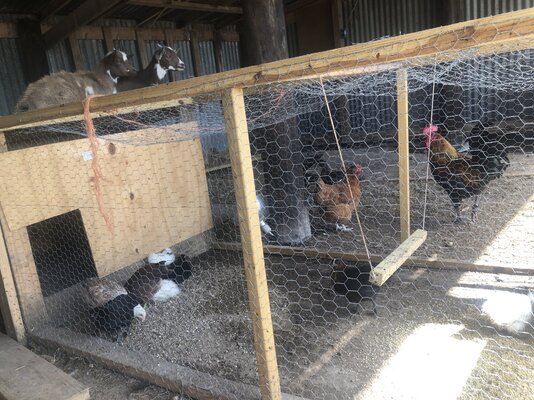I hatched 17 chicks, I moved them outside once they were old enough. For a while it was fine then a snake ate 3 of my chicks, later 2 died in the middle of the night, and the next night 1 more died. Fast forward to today I found 1 more dead. Pls help I don’t think it’s too cold and they have plenty of food and water
Navigation
Install the app
How to install the app on iOS
Follow along with the video below to see how to install our site as a web app on your home screen.
Note: This feature may not be available in some browsers.
More options
You are using an out of date browser. It may not display this or other websites correctly.
You should upgrade or use an alternative browser.
You should upgrade or use an alternative browser.
Juvenile chicks dying
- Thread starter gjlegg1
- Start date
Could it be coccidiosis? @Eggcessive
Mamatomany123
Crowing
How old are they? What's the temperature? Do you have pictures of the setup they're in?
- Thread starter
- #4
We live in Texas so 70-90 degreesHow old are they? What's the temperature? Do you have pictures of the setup they're in?
- Thread starter
- #5
Not sure, how do I check for that?Could it be coccidiosis? @Eggcessive
- Thread starter
- #6
We live in Texas so 70-90 degrees, they are About 40-35 days old
Attachments
Hensintexas
Songster
Do you have your chicks on medicated feed? It helps prevent (and treat) coccidiosis. If you have a vet who works with farm animals, he can check a poop sample to see if they are infected, and treat accordingly.
Hensintexas
Songster
We’re in Texas, too. Hot, humid, and just yuck! Rain would be better than this.
I hope your babies are better soon.
I hope your babies are better soon.
Do they have blood in their dropping? Are they lethargic?Not sure, how do I check for that?
How long since they were moved outside?I hatched 17 chicks, I moved them outside once they were old enough. For a while it was fine then a snake ate 3 of my chicks, later 2 died in the middle of the night, and the next night 1 more died. Fast forward to today I found 1 more dead. Pls help I don’t think it’s too cold and they have plenty of food and water
Notice any standing around puffed up and not eating? (That bald Eagle looking one is too cool!)
Coccidiosis is top suspect.. noting only 1 of the 9-11 strains currently known to effect chickens will present as blood in droppings.
Medicated feed can help prevent coccidiosis but will NOT do anything to treat as it is low dose and birds can still succumb if conditions are right!
A fecal float (under a microscope) at the vet MAY prove load conditions though ALL parasitic stuff can be passed intermittently and therefor may not show up.. but treating with Corid is SAFE.. I would use the drench dosage, it works by mimicking thiamine to starve out and slow the growth of the coccidia protozoa (so the birds can build more natural resistance) it does NOT kill them and is not an antibiotic.
FWIW.. bare ground (like their enclosure) is an absolute no no for me as it's a breeding ground for all the bad bacteria stuff.. Looks like their pecking right at it.. Making it more "semi" deep litter.. or like the forest floor mulch with layers of different shaped materials (leaves, bark, shavings, pine needles, grass clippings, hay, etc).. invites good stuff (bugs and bacteria) to the party to balance things out a bit more.
I concur that they should be warm enough especially in a group that size being able to huddle.
Other less likely considerations at that age (and with the description so far) would be (lethal) genetics, Marek's, or the the (HP) avian influenza.
There are usually symptoms that could point to cause.. but it can be especially easy to miss in groups that large.
Hope you get answers fast!

Similar threads
- Replies
- 16
- Views
- 635
New posts New threads Active threads
-
Latest threads
-
Wet & Dry Fowl Pox or Canker?
- Started by IntiInti
- Replies: 0
-
I just found out the hens I bought were vaccinated with mareks vaccine and I think my rooster is sick now
- Started by JarrodnJojo2016
- Replies: 2
-
Need help identifying breed and gender please
- Started by stenger3775
- Replies: 3
-
-
-
-
Threads with more replies in the last 15 days
-
-
Question of the Day - Thursday, August 14th, 2025
- Started by casportpony
- Replies: 75
-
Still no idea what’s going on with my hens comb and growing black spots
- Started by Ohsrsly
- Replies: 64
-
Ended BYC Poultry Caption Contest 08-08-25 Pic by Molpet
- Started by TwoCrows
- Replies: 62
-
-
×




